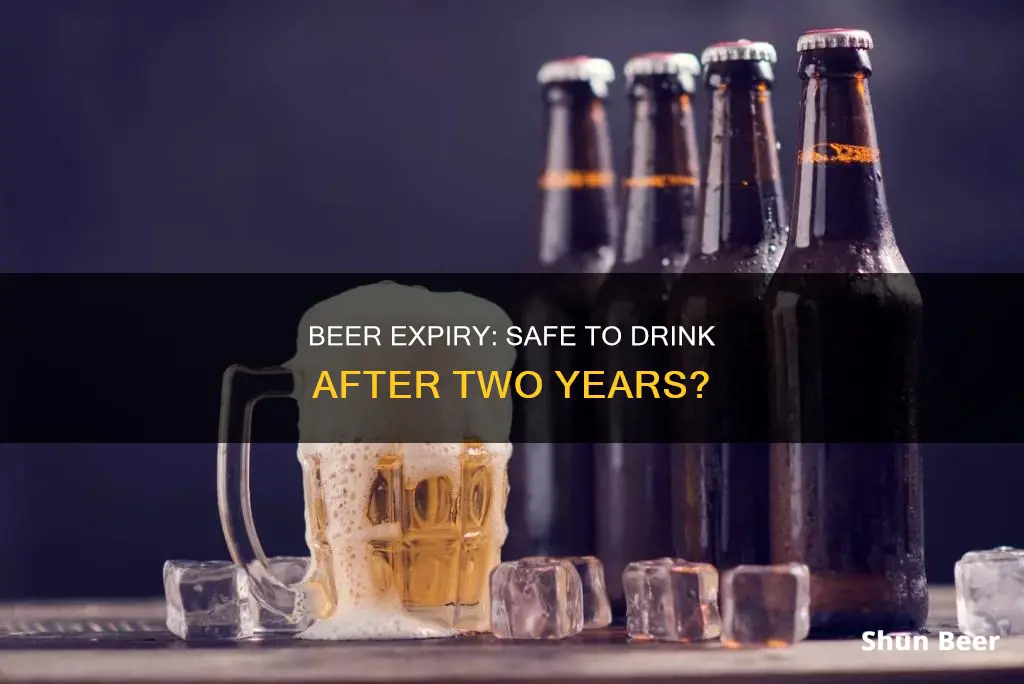
Beer typically has a “best before” date, which is a guideline on quality rather than safety. This means that the beer will start to lose its quality after the stated date but can still be consumed. Beer doesn't expire in the same way that food does, and it's unlikely to make you sick even if it has been sitting on the shelf for years while sealed. However, the taste of beer changes over time, and it may not be as refreshing as a fresh beer. Proper storage, such as keeping the beer refrigerated, upright, and away from direct sunlight, can help extend its shelf life.
| Characteristics | Values |
|---|---|
| Drinking expired beer | It is safe to drink beer past its drink-by date. |
| Taste | The beer will likely taste bad. |
| Health risk | There is no health risk in drinking old beer. |
| Fizziness | If the beer has lost its fizz, it means the seal was broken at some point. |
| Storage | Store beer in a cool, dark place, preferably the refrigerator. |
What You'll Learn

Beer can be safely consumed past its expiration date
The main factors that cause beer to spoil or "skunk" are light, oxygen, heat, and time. Hops are sensitive to UV radiation from the sun, which is why most beer bottles are tinted brown. Even if exposed to sunlight for under an hour, beer will undergo a chemical reaction that produces 3-methyl crotyl mercaptan, a compound that gives off a distinct skunky flavor. Oxidation also generally has a negative effect on beer, as oxygen interacts with the compounds from malt, yeast, and hops, causing a disappointing papery taste. Heat speeds up oxidation, so storing beer in a refrigerator is recommended. Lastly, time inevitably causes the flavor of beer to taper off and turn, especially for hoppy beers, which tend to "expire" faster.
To prevent bad beer, it is important to keep it in a cool, dark place, preferably the refrigerator. If storing at room temperature, ensure that the beer is not exposed to sunlight. Leaving beers standing upright also allows for less exposure to oxygen than when the bottle or can lies on its side.
It is important to note that different types of beers have different shelf lives. Certain high-alcohol, malt-forward styles, such as barley wines and imperial stouts, are sometimes brewed with aging in mind and can improve with age. On the other hand, IPAs are best enjoyed as fresh as possible, as they tend to lose their hoppy aromas and turn green after a few months.
Drinking Beer in Public: What's the Legal Limit?
You may want to see also

It won't make you sick, but it might taste bad
It's unlikely that drinking a beer that expired two years ago will make you sick. However, it might not taste very nice.
Beer does expire, but it doesn't go off in the same way that fresh food or milk does. The alcohol content and the presence of hops, which have antimicrobial characteristics, mean that there's very little risk of pathogenic growth.
The main thing that happens to beer as it ages is that its flavour starts to deteriorate. Oxygen interacts with the compounds from malt, yeast and hops, causing oxidation and a disappointing papery or cardboard-like taste. Heat speeds up oxidation, so it's best to store beer in a refrigerator.
Light can also cause a chemical reaction in hops compounds, creating a compound that smells and tastes almost identical to a skunk. That's why beer bottles tend to be brown – to block UV light – and why beer also comes in aluminium cans.
Some beers, like porters and stouts, can get better with age, especially if they're kept in cool, dark storage. But IPAs, for example, are best enjoyed as fresh as possible.
Beer Consumption: What's Safe to Drink?
You may want to see also

Beer should be stored in a cool, dark place
Beer is the world's third most popular drink, but it doesn't last forever. Proper storage is essential to preserving its quality and maximising its shelf life. Beer should be stored in a cool, dark place, and there are several reasons why.
Firstly, beer is susceptible to light exposure, particularly UV rays, which can cause it to develop a "skunky" odour and taste. This is more likely to occur in beers packaged in clear or green bottles, as brown bottles offer better protection by filtering out most of the sunlight. Secondly, heat can cause beer to spoil more quickly. Beer should be stored at temperatures between 50 and 55 degrees Fahrenheit (10-13°C). Storing beer in a refrigerator at a temperature range of 34 to 36 degrees Fahrenheit (1-2°C) can help ensure optimal freshness and extend its shelf life.
It is also important to keep beer away from direct sunlight and heat sources, such as ovens, stoves, and radiators. Beer should be stored in a cool, dark place such as a basement, cellar, pantry, or cupboard. Additionally, beer should be stored in an upright position to limit air contact and slow oxidation.
By following these storage guidelines, you can help ensure that your beer remains fresh and delicious for as long as possible.
Old Beer: Is It Safe to Drink After Four Months?
You may want to see also

Beer is best consumed within 3-6 months of purchase
Oxygen interacts with the compounds from malt, yeast, and hops, causing oxidation and a disappointing papery taste. The longer it's stored, the worse it gets! Heat speeds up oxidation, so it's important to store beer in a refrigerator. Major changes in temperature, like going from a cooler to a hot car, can also negatively impact the taste of beer.
Light, specifically UV light, can also cause a chemical reaction in hop compounds, resulting in an unpleasant skunky taste. That's why beer usually comes in dark bottles or aluminium cans, which help block out UV rays.
Some beers, like barley wines and imperial stouts, are brewed with the intent that they will be aged for a couple of years. However, for most beers, the general recommendation is to drink them as fresh as possible. This is especially true for hop-heavy styles like IPAs, as the volatile aromas from hops tend to dissipate over time.
So, while you can safely drink beer past its expiration date, it's best to consume it within 3-6 months of purchase to ensure optimal taste and quality.
Mixing Beer and Oxycodone: What's the Danger?
You may want to see also

Some beers, like stouts and porters, can improve with age
While most beers are best consumed fresh, some beers can improve with age. This is especially true for beers with higher alcohol content, such as stouts and porters. These beers tend to have a longer shelf life than lighter beers like lagers and pilsners.
The key factor in determining whether a beer will improve with age is its alcohol content. Beers with higher alcohol content, or ABV, tend to cellar better because the alcohol helps to prevent oxidation. This is why stouts and porters, which typically have a higher ABV, can improve with age.
In addition to alcohol content, the type of beer also plays a role in how well it ages. Beers that emphasize malt, yeast, or other characteristics, rather than hops, are better candidates for aging. This is because the qualities that hops impart tend to fade within a short time. For this reason, IPAs, which are known for their strong hop flavor, are typically consumed fresh.
When it comes to aging beer, proper storage is essential. Beer should be stored in a cool, dark place, away from temperature fluctuations, and upright to minimize oxidation. If stored properly, beers with higher ABV, such as stouts and porters, can develop more complex flavors and a smoother taste over time.
It's worth noting that aging beer is not an exact science, and the results may vary depending on the specific beer and storage conditions. However, if you're interested in exploring the world of aged beers, stouts and porters are a great place to start.
Beer Festivals: A Guide to the Frothy Fun
You may want to see also
Frequently asked questions
Yes, drinking beer that expired 2 years ago is generally safe. Beer doesn't spoil in the same way that other foods and drinks do, and it won't make you sick. However, the taste of the beer will likely be affected, and it may not be very pleasant to drink.
Light, oxygen, heat, and time are the main factors that cause beer to spoil or "skunk". Beer should be stored in a cool, dark place, and it's best to consume it as fresh as possible.
A bad beer will often have a noticeable off-aroma, and it may be flat or lack the usual fizz when opened. There may also be excessive sediment at the bottom of the bottle.
"Use by" dates indicate that the product should be consumed before the specified date for safety reasons. "Best before" dates, on the other hand, are more of a







